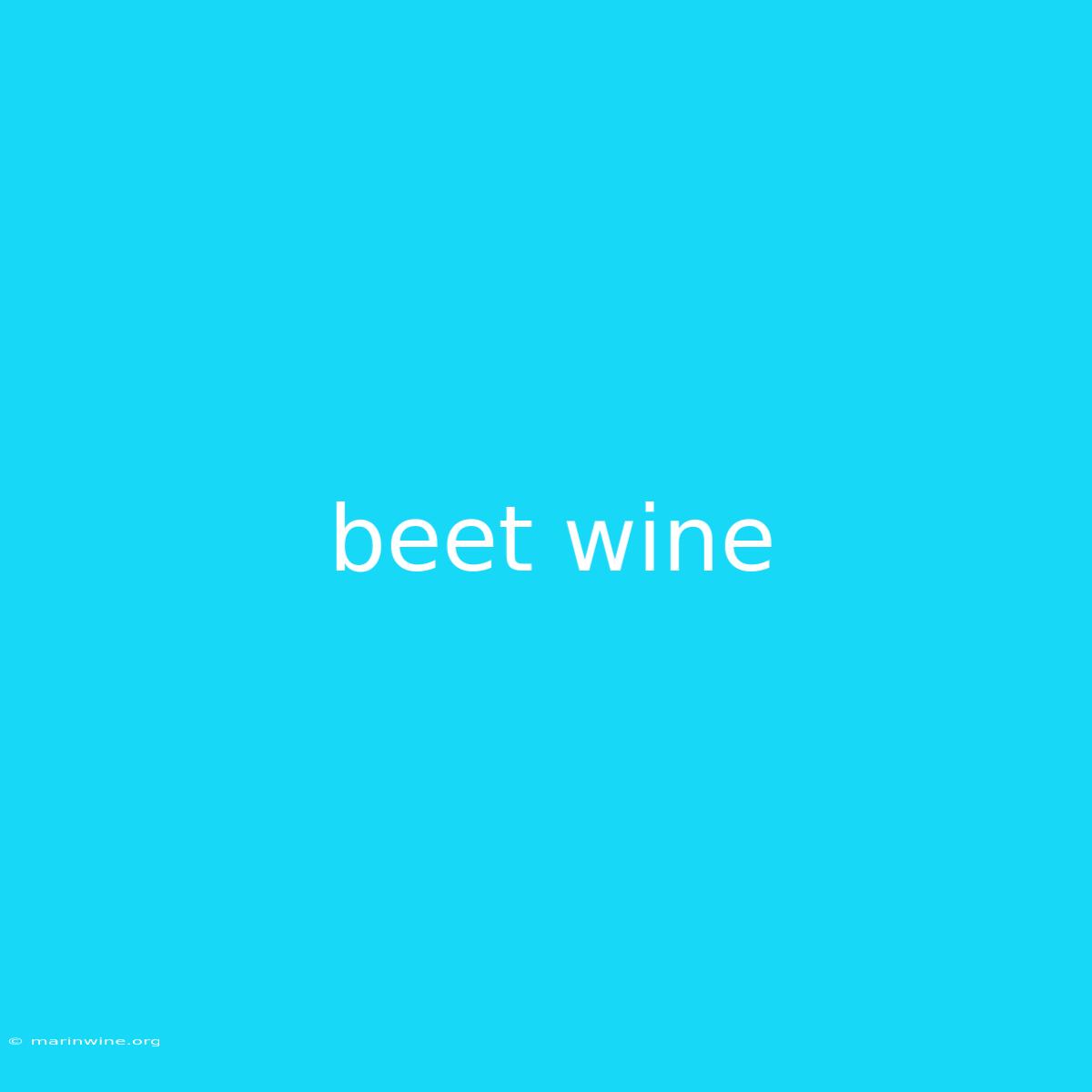The Sweet and Earthy Delight of Beet Wine: A Unique Sip into the World of Winemaking
Have you ever imagined a wine crafted from beets? It might sound unusual, but beet wine is a fascinating and delicious reality. This vibrant beverage offers a unique blend of sweetness, earthiness, and a touch of tartness, creating an unforgettable taste experience.
Why It Matters: Beet wine is more than just a novelty; it's a testament to the versatility of winemaking and a glimpse into the innovative world of fermented beverages. This article dives into the captivating world of beet wine, exploring its history, production process, and the remarkable flavor profile that sets it apart.
Key Takeaways of Beet Wine:
| Aspect | Description |
|---|---|
| Origin | Primarily produced in Eastern Europe, particularly in countries like Poland and Ukraine. |
| Production | Involves fermenting beet juice with yeast and sugar. |
| Flavor Profile | Sweet and earthy with a hint of tartness, often compared to a red wine with notes of cherry or plum. |
| Alcohol Content | Typically ranges from 8% to 12% ABV. |
| Health Benefits | Potential health benefits associated with beets, including antioxidant and anti-inflammatory properties. |
Beet Wine: A Journey of Flavor and Tradition
Beet wine is an ancient tradition, particularly popular in Eastern Europe, where it has been enjoyed for centuries. Its origins likely stem from the need to utilize readily available ingredients during times of scarcity. Today, beet wine continues to be a cherished beverage in many cultures, appreciated for its unique flavor and historical significance.
Key Aspects of Beet Wine Production:
- Selection of Beets: The quality of beets plays a crucial role in determining the final flavor of the wine. Beets with a high sugar content and vibrant color are preferred for winemaking.
- Juice Extraction: The beets are washed, peeled, and then juiced. Modern juicers ensure efficient juice extraction, while traditional methods may involve pressing the beets.
- Fermentation: The beet juice is combined with yeast and sugar, and then fermented in a controlled environment. The duration of fermentation can vary depending on the desired alcohol content and flavor profile.
- Aging and Bottling: After fermentation, the wine may be aged in barrels or tanks to enhance its complexity and smooth out the flavors. Finally, it is bottled and ready for consumption.
The Intriguing Flavor Profile of Beet Wine
Beet wine boasts a captivating flavor profile that distinguishes it from traditional wines. Its unique sweetness stems from the natural sugars present in beets, while a touch of tartness adds a refreshing balance. This combination often evokes comparisons to red wines like Merlot or Cabernet Sauvignon, but with a distinct earthy character. Hints of cherry, plum, and even a subtle hint of chocolate can also be detected, creating a complex and enjoyable taste experience.
The Health Benefits of Beet Wine
Beet wine, like beets themselves, is rich in antioxidants and nitrates, which may offer potential health benefits. Antioxidants help protect cells against damage from free radicals, while nitrates can contribute to improved blood flow and lower blood pressure. However, it's crucial to remember that moderate consumption is key, and it's always advisable to consult a healthcare professional for personalized health advice.
Frequently Asked Questions about Beet Wine:
Q: Is beet wine sweet? A: Yes, beet wine is naturally sweet due to the sugar content of beets. However, the sweetness can be balanced by a touch of tartness, creating a complex flavor profile.
Q: How does beet wine taste? A: Beet wine often has a taste reminiscent of red wine, with earthy notes, hints of cherry or plum, and a subtle sweetness. It can also have a slightly tart quality that adds complexity.
Q: Can beet wine be made at home? A: Yes, beet wine can be made at home using a basic winemaking kit. Several online resources provide detailed instructions and recipes for making beet wine.
Q: Is beet wine alcoholic? A: Yes, beet wine is alcoholic, typically ranging from 8% to 12% ABV.
Q: Does beet wine have any health benefits? A: Beet wine, like beets themselves, contains antioxidants and nitrates, which may offer potential health benefits. However, moderate consumption is crucial.
Tips for Enjoying Beet Wine:
- Serve Chilled: Beet wine is best enjoyed chilled to enhance its refreshing flavors.
- Pair with Food: Consider pairing beet wine with dishes that complement its sweet and earthy notes, such as grilled meats, roasted vegetables, or cheeses.
- Experiment with Cocktails: Beet wine can be used as a base for unique and colorful cocktails, adding a vibrant twist to classic recipes.
- Enjoy Responsibly: As with any alcoholic beverage, enjoy beet wine responsibly and in moderation.
Summary of Beet Wine:
Beet wine is a fascinating and delicious beverage that offers a unique taste experience. From its ancient origins to its modern-day popularity, beet wine has captured the imagination of wine lovers worldwide. Its sweet and earthy flavors, coupled with potential health benefits, make it a compelling addition to any wine enthusiast's repertoire.
Closing Message: Whether you're a seasoned wine aficionado or a curious novice, beet wine is an adventure worth taking. So, raise a glass to this vibrant and flavorful creation, and embark on a journey of discovery in the world of fermented beverages.

